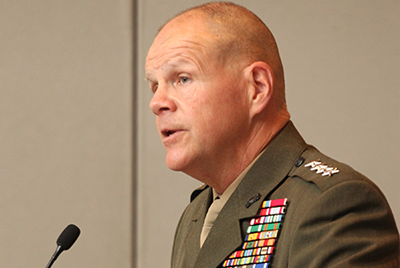Marine Commandant Asks APA Members to Join in Care of U.S. Marines

Gen. Robert B. Neller, commandant of the U.S. Marine Corps and a member of the Joint Chiefs of Staff (pictured above), approached APA’s 2016 Annual Meeting in Atlanta the same way he asks his Marines to approach each day—recognize when you need help and ask for it.
“We need your help,” Neller told meeting attendees yesterday during the session “The Marine Corps and Mental Health Issues.” He continued, “Come and look at our programs. Help us build greater resiliency. Learn about our culture.”
The Marine Corps trains its recruits to be tough, resilient, adaptable in overcoming obstacles, and most of all, to be members of a team, Neller explained. When something happens, that sense of cohesion usually sustains them. But not always.
Sometimes this culture works against them, he said. Talking about their internal stresses or anxieties doesn’t come easy but it’s essential, he said.
Neller said he is especially concerned about suicides among current and former members of the Corps. Surviving battle may be a risk factor, but the majority of Marines who die by suicide never saw combat, he said.
Even for civilian practitioners, supporting the mental health of U.S. service members can start with routinely asking patients if they have ever served in the armed forces, said Neller. More than 30,000 Marines complete their service and return home each year, and most will receive their health care in the communities where they live, he noted. Inquiring about a patient’s history of service can open a door to a critical part of a patient’s life—one than doesn’t end on the day they step out of uniform.
“We as leaders say to anyone who has served in the military: Your team needs you, your family needs you, your country needs you,” he concluded. “So if you’re struggling, tell someone and that someone is obligated to get you help.”
(Image: David Hathcox)
|
|
|
|
|


